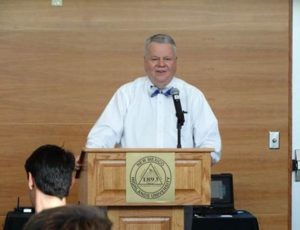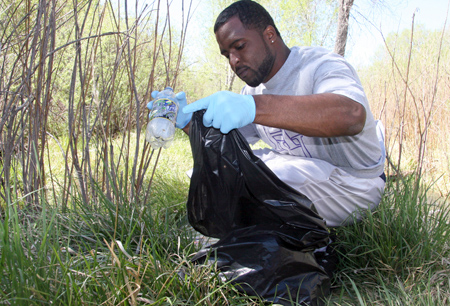
Highlands University President Minner
September 28, 2021
Hourly employees at Highlands who were a part of the non-exempt union bargaining agreement will soon see their hourly wages jump from $12 to $15 an hour. During a special Board of Regents meeting that convened Sept. 27, board members voted unanimously to approve the wage increase.
The vote came after months of collective bargaining. According to Labor and Employee Relations Officer Mariama Whalen, bargaining was done in good faith, and creative solutions were offered by everyone involved.
Most of the employees at Highlands University who can expect to see their wages increase work in trades and custodial positions. Facilities and Planning Director Sylvia Baca says the pay increase will provide significant relief to the majority of her department’s employees.
“This has historically been a group of people who just over a year ago were making $9 an hour, and a lot of my employees had to work two jobs to make ends meet,” said Baca. “Some are single parents, and even for those who are married, one of the parents often has to stay home to care for the children because childcare is so expensive.”
Baca said she hopes the wage increase will improve her employees’ lives in a variety of ways, from meeting the daily demands of life like food and housing to providing the ability to make lives better.
“This is tremendous. I am so grateful to the administration for working this out to make this possible,” said Baca. “This is going to be a game changer for many families, and it may allow them to reach goals they weren’t able to reach before.”
James Chavez, who works for the maintenance department, said his job at Highlands is just one of three jobs he works. He owns two businesses that until now have brought in more money than his custodial work.
“I have three children, and I am separated, so I do have to work a second job,” said James Chavez. “But at the same token, Highlands does have benefits such as my children get to go to school without tuition.”
James Chavez said he pays for his mom’s bills, too, so the wage increase will help him stretch his money further.
“It is kind of a big deal, honestly,” he said. “It’s one of the best jobs I’ve ever had. They take care of us here.”
Jesus Chavez, who started working in maintenance at Highlands in 2020 after having worked at Dollar Tree for many years, echoed many of James Chavez’s sentiments. He said he is raising a son and hopes that the wage increase will help him achieve personal goals.
“Within the next year or two, I want to get a loan to buy a house, so the raise is actually going to really affect what we’re trying to do,” said Jesus Chavez. “I really love Highlands. Now that we’re actually getting the $15, it’ll be better for a lot of us. Highlands takes care of us.”
Highlands President Sam Minner said he’s been working on getting this wage increase since his early days on campus.
“I can’t stop smiling about what we’re doing today,” said Minner. “I want to thank both bargaining teams—I know this can be difficult.”
President Minner said he would not stop at $15 an hour and that while he remains in his position at Highlands, he will continue working on compensation issues. According to his calculations, it would take over a decade of 1.5 percent annual wage increases to move from $12 to $15 an hour, something he said should not be tolerated.
“I know for sure how to improve economic development in a community–It’s a guarantee you pay the people who live and work there a fair wage,” said Minner. “It’s also about something much more—it’s a question of human dignity. It’s not okay to work for a state agency and have people have to have a second job in order to live. That’s unacceptable to me in a wealthy nation so it’s really about that.”
According to Denise Montoya, associate vice president for finance, administration, and government relations, the increase in pay will benefit many of the people who have had to be physically present for work on campus throughout the pandemic.
Whalen acknowledged the hourly employees’ work through the pandemic as well.
“They were on the ground, and they were working. This is a wonderful ‘thank you’ as well as acknowledgement of the work that they do for Highlands,” said Whalen. “The increase in compensation for the lowest paid employees is a change in the quality of life, as well as market competitiveness for these employees.”
Montoya reiterated the ways the pay increase will have future benefits for employees.
“The quality of the applicant pool increases for our postings, staff retention increases, and improves the overall competitiveness of the university as an employer of choice,” said Montoya. “It also supports the economic stability of a small rural community.”
Baca, who has been struggling to fill vacancies in her department, is hopeful that the wage increase will attract applicants, and she said the boost in pay will have a ripple effect in Las Vegas.
“I think that it was a great move by the administration, because this is an economically challenged, rural area of our state. This bump is going to have farther reaching impacts,” said Baca. “It’s going to generate more spendable dollars in our town. Most of the affected people shop locally, they buy their products here in Las Vegas, I see a lot of that generating more revenue for Las Vegas, and that in turn will help support other businesses locally. It’s a very good move for rural New Mexico.”
Following the vote to approve the wage increase for non-exempt hourly workers, President Minner thanked board members for their support.
“I’m really so happy about this. It’s a wonderful and beautiful day for Highlands,” said Minner. “We’ve taken a huge forward step. This will make things better. And I’m not done yet. Highlands should be the best employer in northern New Mexico—that’s the goal.”

